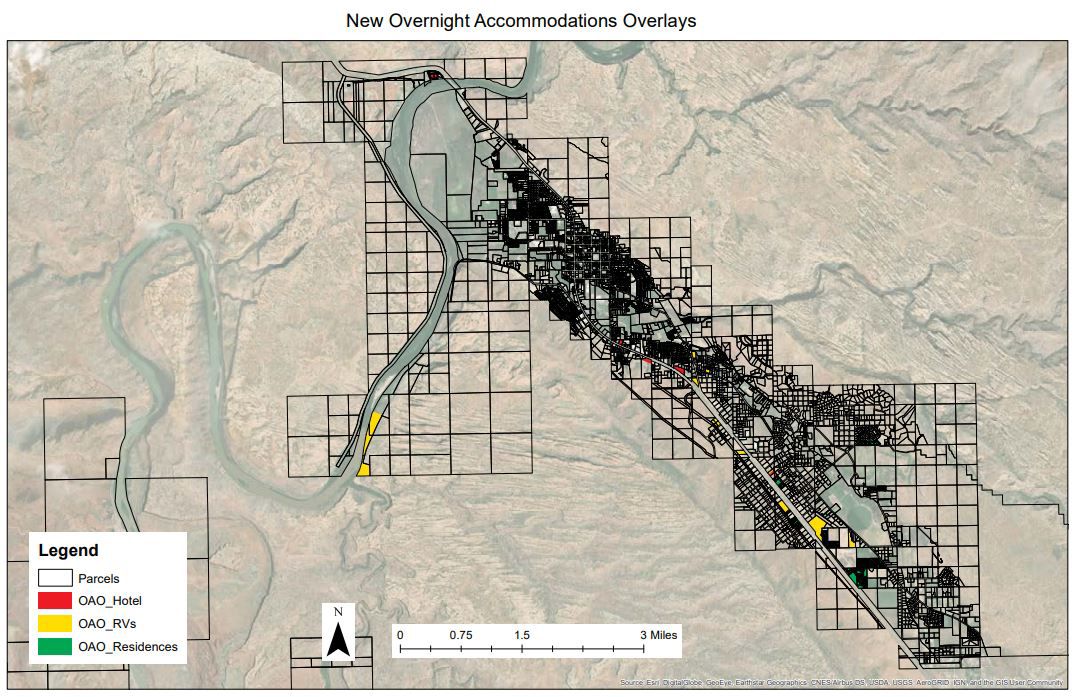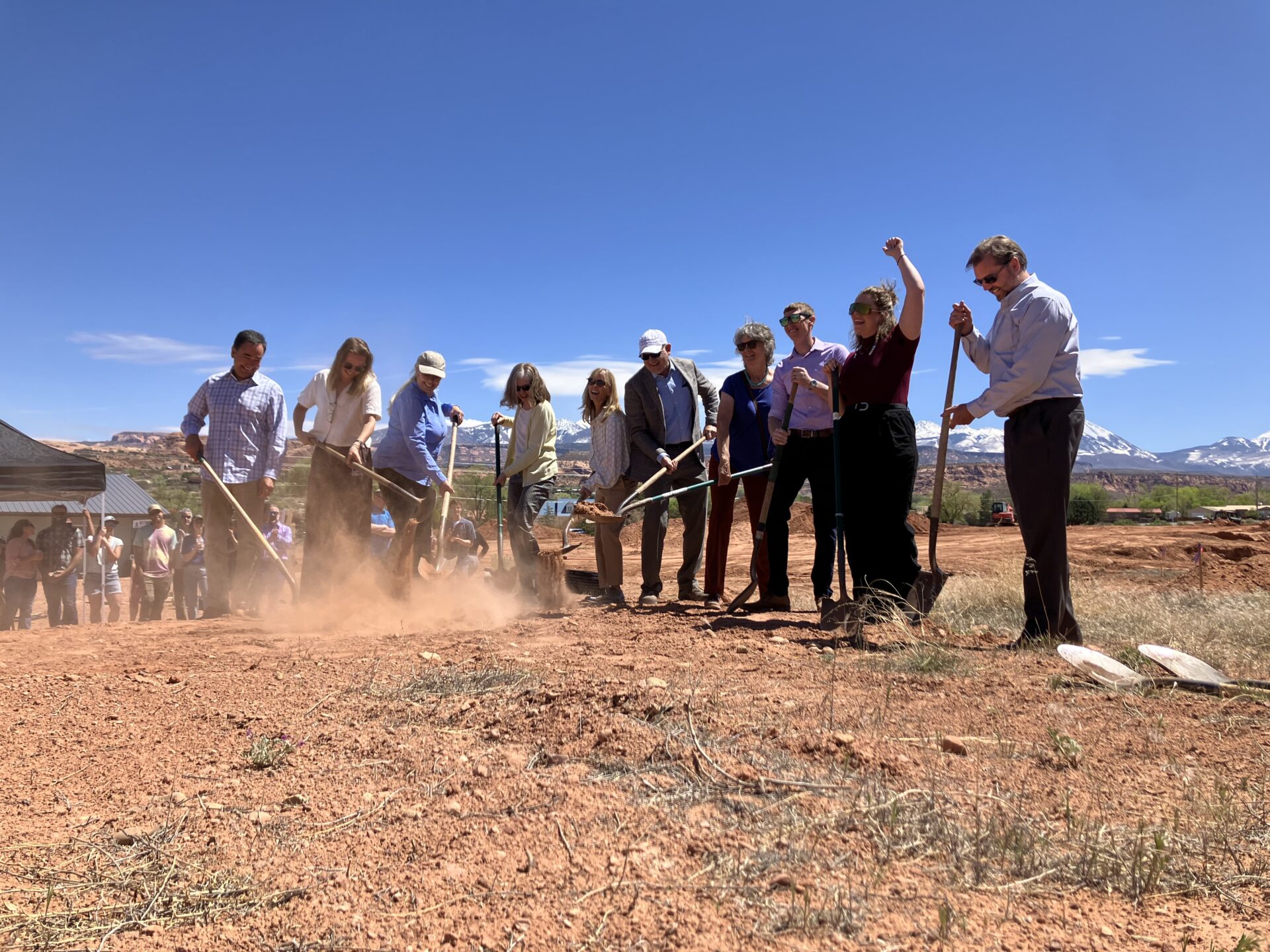Moab’s growing pains may soon be yours if you own real estate in the county.
Temporary moratoria have halted new overnight lodging project applications in Moab and Grand County. With the deadline looming for the county moratorium’s expiration in August, county agencies are moving to implement sweeping changes to commercial and residential property rights.
The Grand County Planning Commission, Grand County Community and Economic Development Department and the Grand County Council are listening to public comments and feedback on land use and development in the county. The county is holding a hearing on July 2 to give the public an opportunity to weigh in on a newly proposed ordinance that would change property rights by removing nightly rentals as a use by right.
A recent public notice states that the change will not impact existing nightly rentals and vested projects for commercial properties.
The proposed ordinance aims to repeal the existing overnight accommodations overlay, remove nightly rentals as a permitted use from all zones, which would then initiate a process by which property owners would need to formally apply to have one of the three new overlay zones applied to their property for overnight accommodations (these proposed overlays are separate from the High Density Housing Overlay passed in January affecting residential development).
Three new use-specific overlays are being designed to replace the single overnight accommodations overlay: an overlay for hotels and motels; one for RV parks and campgrounds; and an overlay for residences (nightly rentals), said Grand County Community and Economic Development Department Director Zacharia Levine on June 4.
The June 4 county council meeting was followed by another discussion with the council on June 18.
Council members expressed concerns and asked questions about the proposed changes to zoning and property rights in the county. Discussion will also take place at the July 2 public hearing on the issue. The council has not made any indication as to when the proposed changes could be voted upon for approval.
“The overlay that’s created for nightly rentals, and only including subdivisions and not existing businesses and vested developments … I think we need to get some consensus on that,” Grand County Council member Curtis Wells explained on June 18. “There are people that are currently operating a conforming nightly rental business as a permitted use that are going to have that use removed from their zoning because they’re not included in this overlay because their business isn’t in a greater subdivision of nightly rentals. They’re being removed due to that fact.”
“Do you know how many of those fall into that scenario?” Grand County Council chair Evan Clapper asked.
“Not off the top of my head,” Levine responded.
Grand County Council member Jaylyn Hawks questioned the intention to restrict people in residential areas from operating nightly rentals in residential zones but not those operating in commercial zones.
“They are residential units choosing overnight rentals, partially, and they are vested just like the highway projects,” she said.
(Before they offered their comments on the issue, both Wells and Hawks read aloud disclosures explaining that they respectively own and operate nightly rentals in the county, but each said that they have no financial gain to make from the new policies and ordinances.)
Comments have been made at the meetings about restricting the ability of campgrounds to turn into larger hotel developments and to restrict re-development of existing properties to prevent them from increasing their number of lodging units.
There are 4,681 constructed overnight rental units in Grand County, with about another 1,600 vested but not yet constructed, according to a catalog of overnight accommodations developments compiled by the Grand County Community and Economic Development Department. This indicates a maximum 38% increase in overnight rentals but only if all of the constructed and vested units open as overnight rentals; not all of the units are currently operating as overnight rentals, the catalog shows.
Levine said on June 4 the county is “miles ahead of where we were four months ago” on adopting new policies on development in the county and said the county is continuing to work through “nuances” and details.
“I feel like the process is going well,” Clapper said. “It seems like we’re on par to have some policies in place by the end of this six months (when the moratorium expires).”
“The planning doesn’t stop on Aug. 2 when this moratorium ends,” Levine said. “… the reality is we have a lot more planning to do.”
PUBLIC COMMENTS
Several people gave public comments on the changes to property rights and zoning overlays during the June 18 council meeting.
“Economics 101,” began Joe Kingsley. “It is very hard to recover from a mistake. It is very easy to shut off an economic string. It is very hard to recover from that. The other point that I would like to make is be careful because you are taking a vested right out of commercial zoning. … If I had vested money in land, in a commercial zone which currently has overnight lodging, and you take it away from me, that’s called a ‘takings.’”
Kingsley was referring to the word “takings” as a legal term. In the general legal definition of the term, a regulatory takings is regarded as an action taken by a government entity that restricts a right so much so that its impacts are similar to a physical seizure.
The “whole ordinance concept,” Kingsley said, “is a slippery slope.”
“I know there’s a problem, I’m not denying that,” Kingsley continued. “But I’m saying we need creativity and thinking out of the box, and a takings is not creativity. Be careful. This is a slippery slope.”
James Keogh said he owns a property on Spanish Valley Drive that has split zoning for both commercial and residential use. He’s owned the property for more than 30 years, he said.
“My property rights going away, it bothers me a little,” he said. “I feel like I probably made a mistake by investing in Grand County … I could have bought cheaper real estate elsewhere and probably still lived close by.”
Another man who lives in the county north of Moab said the City of Moab and Grand County “have very, very different problems.”
“So this moratorium … the restriction has been imposed county-wide,” he said. “So you have a little teeny micro-area (Moab) and we’re applying these general rules to the whole county and they don’t fit the whole county. They fit Moab.”
While the new county policies would apply to properties outside of city limits, the City of Moab has implemented its own moratorium and is also working on potential changes to land use and development.
The public hearing on July 2 begins at 5 p.m. in the Grand County Council’s chambers at 125 E. Center St.
Three new overlay zones proposed to regulate lodging in Grand County
“The planning doesn’t stop on Aug. 2 when this moratorium ends.”




